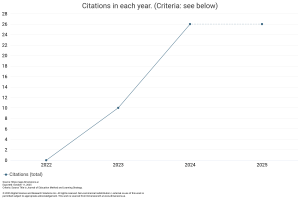Organizational Communication for Excellent Education: A Model at Modern Islamic Elementary School Raudhatul Ma’arif, Bungo
DOI:
https://doi.org/10.59653/jemls.v2i01.376Keywords:
Organizational Communication, Stakeholder Participation, Holistic Communication ModelAbstract
This study aims to explore and discover the model of organizational communication effectiveness on learning in MI Modern Raudhatul Ma’arif, Muara Bungo, Jambi. Effective communication among teachers, school staff, and students plays a crucial role in formulating clear learning objectives and facilitating a better understanding of academic expectations. Communication enhances teaching quality by supporting open exchanges of knowledge and experiences. The involvement of parents is considered crucial, and strong organizational communication can strengthen collaboration between the school and families. Limited organizational communication can lead to misunderstandings, job dissatisfaction, and obstacles to achieving optimal educational outcomes. A qualitative method with the Grounded Theory approach was employed, involving various stakeholders such as teachers, students, parents, and administrative staff. This research is essential in understanding how organizational communication influences learning, teaching quality, and parental involvement in the continuously evolving education landscape. The study findings indicate that MI Modern Raudhatul Ma’arif has successfully established harmony between formal and informal communication, making organizational communication a cornerstone in achieving school objectives. The holistic and effective organizational communication model in MI Modern Raudhatul Ma’arif can serve as an example for other schools, providing a foundation for an inclusive, transparent, and positive educational atmosphere.
Downloads
References
Beauchamp, G., Hulme, M., Clarke, L., Hamilton, L., & Harvey, J. A. 2021. “‘People miss people’: A Study of School Leadership and Management In The Four Nations Of The United Kingdom In The Early Stage Of The Covid-19 Pandemic.” Educational Management Administration & Leadership, 49(3), 375-392. https://doi.org/10.1177/1741143220987841
Bonvillain, N. 2019. Language, Culture, And Communication: The Meaning of Messages. New York: Rowman & Littlefield.
Charmaz, K. 2014. Constructing Grounded Theory. California: SAGE Publications.
Conus, X., & Fahrni, L. 2019. “Routine Communication Between Teachers And Parents From Minority Groups: An Endless Mis Understanding?” Educational Review, 71(2), 234-256. https://doi.org/10.1080/00131911.2017.1387098
Creswell & Creswell. 2017. Research Design: Qualitative, Quantitative, and Mixed Methods Approaches. California: SAGE Publications.
Creswell & Poth. 2018. Qualitative Inquiry and Research Design: Choosing Among Five Approaches. California: SAGE Publications.
Epstein, J. L., & Sheldon, S. B. 2019. “The Importance of Evaluating Programs of School, Family and Community Partnerships.” Aula abierta, 48(1), 31-42. https://doi.org/10.17811/rifie.48.1.2019.31-42
Gordon, S. P., Jacobs, J., Croteau, S. M., & Solis, R. 2021. “Informal teacher leaders: Who They Are, What They Do, And How They Impact Teaching and Learning.” Journal of school leadership, 31(6), 526-547. https://doi.org/10.1177/1052684620924468
Haleem, A., Javaid, M., Qadri, M. A., & Suman, R. 2022. “Understanding The Role of Digital Technologies In Education: A Review.” Sustainable Operations and Computers, 3, 275-285. https://doi.org/10.1016/j.susoc.2022.05.004
Kartika Yulianti, Eddie Denessen, Mienke Droop & Gert-Jan Veerman. 2022. “School Efforts To Promote Parental Involvement: The Contributions of School Leaders And Teachers.” Educational Studies, 48:1, 98-113. https://doi.org/10.1080/03055698.2020.1740978
Kioupi, V., & Voulvoulis, N. 2019. “Education For Sustainable Development: A Systemic Framework For Connecting The SDGs To Educational Outcomes.” Sustainability, 11(21), 6104. https://doi.org/10.3390/su11216104
Lewis, L. 2019. Organizational change: Creating Change Through Strategic Communication. John Wiley & Sons.
Lubis, F. R., & Hanum, F. 2020. “Organizational culture.” In 2nd Yogyakarta International Conference on Educational Management/Administration and Pedagogy (YICEMAP 2019) (pp. 88-91). Atlantis Press. https://doi.org/10.2991/assehr.k.201221.020
Malluhi, H. H., & Alomran, N. M. 2019. “Family Volunteers as Alternative Future Resources: School Leaders' Beliefs And Practices.” International Journal of Emerging Technologies in Learning, 14(10), 88. https://doi.org/10.3991/ijet.v14i10.10189
Nirbita, B. N., & Widyaningrum, B. 2022. Komunikasi Pendidikan. Bayfa Cendekia Indonesia.
Ratna, H. 2019. “The Importance of Effective Communication in Healthcare Practice.” Harvard Public Health Review, 23, 1–6. https://www.jstor.org/stable/48546767
Sakti Ranjan Mishra & Badshah Ghosh. 2021. An Introduction to Sports Management and Curriculum Design in Physical Education. New Delhi: Friends Publication
Sedova, K., Sedlacek, M., Svaricek, R., Majcik, M., Navratilova, J., Drexlerova, A., ... & Salamounova, Z. 2019. “Do Those Who Talk More Learn More? The Relationship Between Student Classroom Talk and Student Achievement.” Learning and instruction, 63, 101217. https://doi.org/10.1016/j.learninstruc.2019.101217
Tahalele, O. 2022. “Efektivitas Komunikasi Organisasi Pada Organisasi Fakultas Ilmu Sosial dan Ilmu Politik Universitas Pattimura.” Jurnal Multidisiplin Madani, 2(5), 2357-2374. https://doi.org/10.55927/mudima.v2i5.379
Tan, F. D., Whipp, P. R., Gagné, M., & Van Quaquebeke, N. 2019. “Students’ Perception of Teachers’ Two-Way Feedback Interactions That Impact Learning.” Social Psychology of Education, 22, 169-187. https://doi.org/10.1007/s11218-018-9473-7
Van Waeyenberg, T., Peccei, R., & Decramer, A. 2022. “Performance Management and Teacher Performance: The Role of Affective Organizational Commitment and Exhaustion.” The International Journal of Human Resource Management, 33(4), 623-646. https://doi.org/10.1080/09585192.2020.1754881
Widodo, H. 2019. “The Role of School Culture in Holistic Education Development in Muhammadiyah Elementary School Sleman Yogyakarta.” Dinamika Ilmu, 19(2), 265-285. https://doi.org/10.21093/di.v19i2.1742
Downloads
Published
How to Cite
Issue
Section
License
Copyright (c) 2023 Yudo Handoko

This work is licensed under a Creative Commons Attribution-ShareAlike 4.0 International License.
Authors who publish with this journal agree to the following terms:
- Authors retain copyright and grant the journal right of first publication with the work simultaneously licensed under a Creative Commons Attribution-ShareAlike that allows others to share the work with an acknowledgement of the work's authorship and initial publication in this journal.
- Authors are able to enter into separate, additional contractual arrangements for the non-exclusive distribution of the journal's published version of the work (e.g., post it to an institutional repository or publish it in a book), with an acknowledgement of its initial publication in this journal.
- Authors are permitted and encouraged to post their work online (e.g., in institutional repositories or on their website) prior to and during the submission process, as it can lead to productive exchanges, as well as earlier and greater citation of published work (See The Effect of Open Access).
























